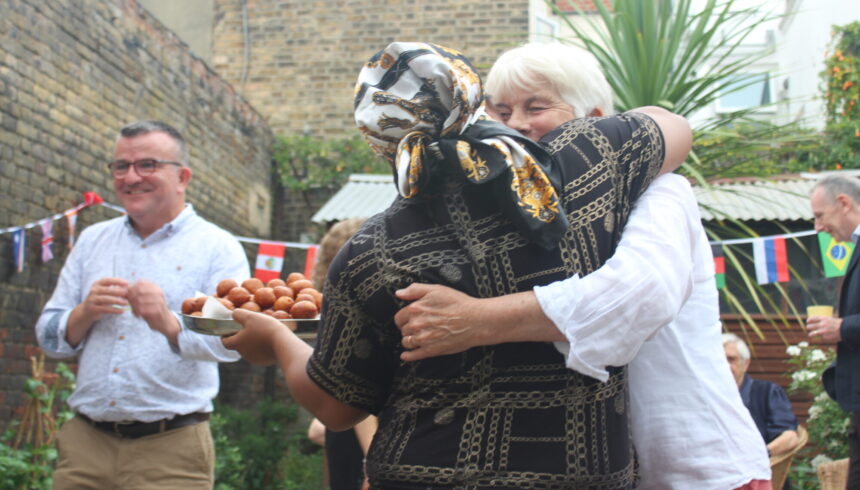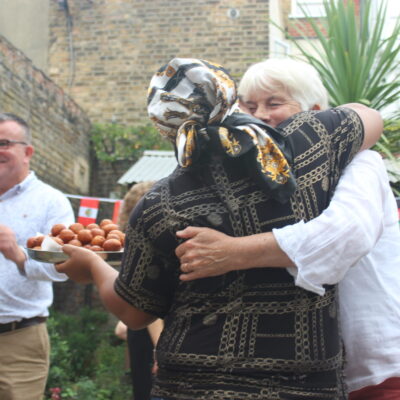It feels fitting that World Homelessness Day and World Mental Health Day fall on the same date. Together, they invite us to pause and reflect on something we know deeply from experience: a safe home is the foundation for wellbeing.
In recent years, there has been growing awareness of trauma and its impact on our lives. Social media feeds and bookshops are filled with conversations about boundaries, safety, and healing. The language of trauma has entered everyday life, helping people recognise how fear and instability shape our minds and relationships.
And yet, in our communities, we see something very different unfolding. People seeking sanctuary are increasingly demonised. There are protests outside hotels that already feel unsafe, hostile headlines that stir up fear, and a political climate that treats human beings in need of protection as threats to be contained. This contradiction could not be starker. We cannot claim to value safety and healing while denying it to those who need it most.
If we want to build communities that are truly safe, we must begin by protecting those most at risk. Safety cannot exist in isolation; it is something we create together through compassion, connection and justice.
At JRS UK, our work is built on these values. We know that our refugee friends’ journey to stability begins when they feel welcomed in a safe environment. Often, that begins at our centre, when someone shares a hot drink with a volunteer, builds trust with a caseworker, and connects with others through our activities programme. Over time, our refugee friends feel better able to identify and advocate for their most pressing needs.
For many, that journey leads to finding stable accommodation, yet even this can feel hugely risky when their experience in the UK has been alienating or harmful. That is where our host community plays such a vital role – our hosts do more than meet a practical need for accommodation, they help restore something that years of exclusion often take away: trust and agency.
Through the companionship of hosts, we see refugee friends begin to renew their strength and dignity. When they later move into our community housing, that foundation of trust allows healing to deepen.
“Before I came to JRS UK, I was in a bad place. After years of waiting, I was tired out and I had enough. I was down in my mind – in and out of hospital for my mental health. I was sofa surfing and never had anywhere I could properly rest. All that changed when I was welcomed into the home of a lovely couple called Gina and Michael through JRS UK’s hosting programme. I was a very reserved person before being hosted, but they really looked after me and made me feel welcome.”
“I will tell you what I learnt from hosting. I learnt something very important in my life, psychologically, is that love can be given by anyone. Before that, I was always thinking that it was only my parents, and family, and best friends who can give me that love, but later on, I realised that it can be given by anyone. That is what I can say to the people who are scared of being hosted.”
“My health is restoring, my body is restored. I don’t have depression as before, I used to cry a lot, depression, sick.. almost everyday sick sick sick.. I haven’t been sick since I came to this JRS accommodation. The Sisters, I love the way they treat me.”
Our houses act as another stepping stone towards recovery. We take a trauma-informed approach, promoting safety, trust, choice, collaboration, empowerment and cultural sensitivity.
We see refugee friends cooking together, tending gardens, sharing laughter and gradually rediscovering a sense of home. The impact is profound, not only on mental health, but also on confidence, relationships and hope.
“Amani House has helped me a lot to stabilise my mental health. I have had quite a tumultuous life and have been taking antidepressants to help me. It is very difficult to come off this kind of medication, but Amani House gave me the space to work through withdrawal symptoms and find other ways of coping. Recently I’ve been meditating, exercising, eating well and trying to find that balance. I don’t need to worry in Amani House; it is far less stressful for me.”
Best practice research and guidance across the sector continue to highlight how vital this is in finding genuine solutions to homelessness. When people feel safe enough, they can recover, rebuild independence and live healthy lives.
“Emilie House is a safe place to be. I’ve been very happy there. When I was angry, the accommodation team helped me to work through it. I learnt to be patient with others and not to act immediately when something annoys me.”
As we mark these two days together, we hold a vision of a future where safe, dignified housing is recognised as a cornerstone of recovery, and where these principles extend far beyond our sector but to all asylum support. Because everyone deserves not just a place to stay, but a place to heal, to grow and to call home.



